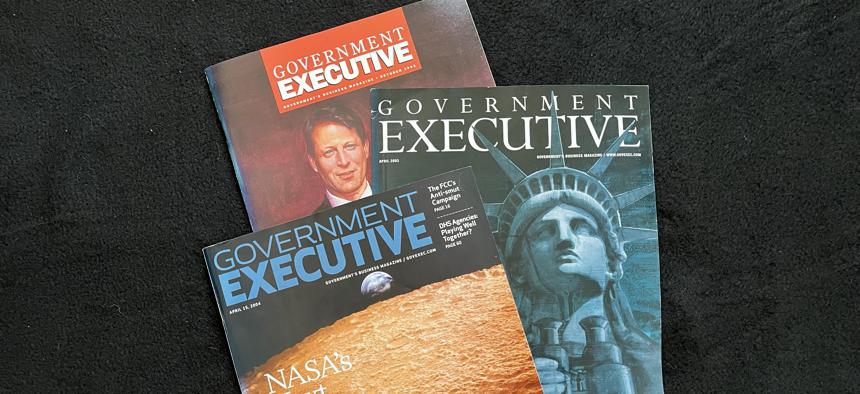
Government Executive started as a print magazine in 1969 and has been a digital publication since 1996. Tom Shoop/Government Executive
What I learned covering government for 34 years
The privilege of reporting on the stuff that really matters.
In the fall of 1989, having somehow managed to talk my way into an assistant editor’s job at a monthly magazine called Government Executive, I journeyed to the National Press Club in Washington for a meeting of the Classification and Compensation Society. (Remember that organization?) As its members grappled with issues like how to wedge modern jobs into the archaic federal job classification system, my head spun. And my stomach growled. On ethical principle, I refused to eat the free lunch they offered.
Still, there I was: a bona fide Washington reporter.
Later I came to realize I’d had the good fortune to be covering the most important part of Washington, and the entire country—federal agencies and the people who run them. The work was never glamorous, sometimes frustrating, but always rewarding. Helping the people who do the behind-the-scenes work of government by sharing some of the best practices and exposing some of the worst is more than I could’ve hoped for.
In the end, it was an extended exercise in trying to describe something by feel in pitch darkness. We in the media cover (and uncover) news of government operations, but rarely get to see the whole picture. Only insiders have that perspective. Still, as an observer and chronicler of the federal establishment for more than three decades as a writer and later an editor, I believe I’ve picked up a few insights. Such as:
The federal government does a much better job than people give it credit for. In just the past two decades, federal employees have developed a COVID vaccine at breakneck speed, averted financial catastrophe, expanded access to health insurance, vastly improved children’s health, boosted infrastructure investments and made highways much safer. There ought to be a hall of fame for the people who make these kinds of things happen. Oh, wait…
No federal employees are non-essential. That label is cruel and wrong.
The federal government is an insurance company with an army. This is a characterization I only recently came across, and if more Americans understood it, we’d be a lot better off. It perfectly describes how once you take entitlement and defense spending off the table—and they’re always taken off the table—what’s left in terms of discretionary spending doesn’t add up to much.
There are hundreds of people who have sustained an effort to improve the management of government for decades. I won’t begin to try to name them. They know who they are. These folks deeply understand the nature of incremental change in the public sector, and have patiently made painstaking progress, with the acronymic legislation to prove it.
Government shutdowns don’t need to happen. For almost two centuries, they didn’t exist.
Every election cycle, a longshot outsider presidential candidate will peddle the snake oil that slashing government spending and reorganizing the bureaucracy is easy. See Ramaswamy, Vivek; Yang, Andrew; Perot, Ross. And who’s to blame them? Every once in a while, one of them wins.
There has never been a federal retirement wave. And there never will be.
There is no President’s Day. Happy Washington’s Birthday in advance, everybody!
Finally, and apropos of almost nothing, Willie Mays was the greatest baseball player of all time, and one time he threw out my dad at third base by a lot.
Thanks to all the terrific reporters and editors I’ve been privileged to work with over the last three decades. They are a stunningly talented and driven bunch. I know this because I’ve spent many hours in conversations about how to pursue key stories, and many late nights covering shutdowns and near-shutdowns, State of the Union addresses and election results. Every minute of that part of the job was highly gratifying.
Most of all, thanks to the loyal readers of this publication for your ongoing service to the nation. I hope I and the people I've worked with have done your efforts justice. If not, it wasn’t for lack of trying.







